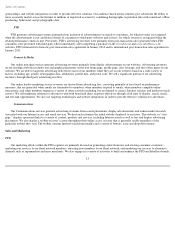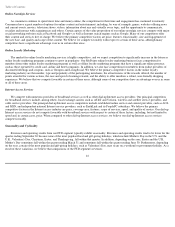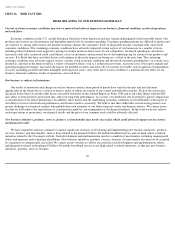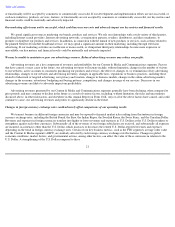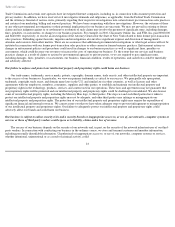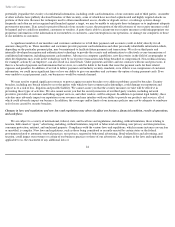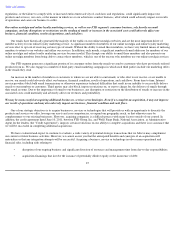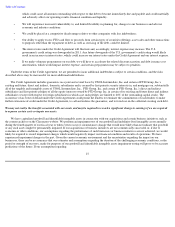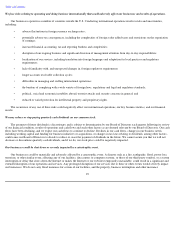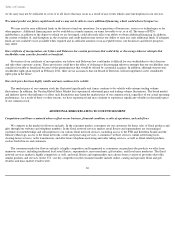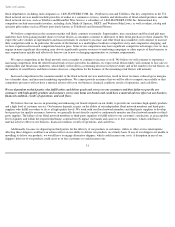NetZero 2011 Annual Report Download - page 25
Download and view the complete annual report
Please find page 25 of the 2011 NetZero annual report below. You can navigate through the pages in the report by either clicking on the pages listed below, or by using the keyword search tool below to find specific information within the annual report.
Table of Contents
Trade Commission and certain state agencies have investigated Internet companies, including us, in connection with consumer protection and
privacy matters. In addition, we have received civil investigative demands and subpoenas, as applicable, from the Federal Trade Commission
and the Attorneys General of various states, primarily regarding their respective investigations into certain former post-
transaction sales practices
and certain of our marketing, billing and renewal practices. We have been cooperating with these investigations. However, the outcome of these
or any other governmental investigations or their potential implications for our business are uncertain. We may not prevail in existing or future
claims and any judgment against us or settlement or resolution of such claims may involve the payment of significant sums, including damages,
fines, penalties, or assessments, or changes to our business practices. For example, in 2010, Classmates Online, Inc. and FTD, Inc. paid $960,000
and $640,000, respectively, to resolve an investigation of the Attorney General for the State of New York related to their former post-transaction
sales practices. Defending against lawsuits, inquiries and investigations also involves significant expense and diversion of management's
attention and resources from other matters. There are no assurances that additional governmental investigations or other legal actions will not be
instituted in connection with our former post-transaction sales practices or other current or former business practices. Enforcement actions or
changes in enforcement policies and procedures could result in changes to our business practices as well as significant fines, penalties or
assessments, which could decrease our revenues or increase the costs of operating our business. To the extent that our services and business
practices change as a result of claims or actions by governmental agencies or private parties, or we are required to pay significant sums,
including damages, fines, penalties, or assessments, our business, financial condition, results of operations, and cash flows could be materially
and adversely affected.
Our failure to enforce and protect our intellectual property and proprietary rights could harm our business.
Our trade names, trademarks, service marks, patents, copyrights, domain names, trade secrets, and other intellectual property are important
to the success of our businesses. In particular, we view our primary trademarks as critical to our success. We principally rely upon patent,
trademark, copyright, trade secret, and domain name laws in the U.S. and similar laws in other countries, as well as licenses and other
agreements with our employees, members, consumers, suppliers and other parties, to establish and maintain our intellectual property and
proprietary rights in the technology, products, services, and content used in our operations. These laws and agreements may not guarantee that
our proprietary rights will be protected and our intellectual property and proprietary rights could be challenged or invalidated. We also license
some of our intellectual property rights, including the Mercury Man logo, to third parties. The steps we and such third parties have taken to
protect our intellectual property and proprietary rights may not be adequate, and other third parties may infringe or misappropriate our
intellectual property and proprietary rights. The protection of our intellectual property and proprietary rights may require the expenditure of
significant financial and internal resources. We cannot assure you that we have taken adequate steps to prevent infringement or misappropriation
of our intellectual property and proprietary rights. Our failure to adequately protect our intellectual property and proprietary rights could
adversely affect our brands and could harm our business.
Our business is subject to online security risks and a security breach or inappropriate access to, or use of, our networks, computer systems or
services or those of third
-party vendors could expose us to liability, claims and a loss of revenue.
The success of our business depends on the security of our networks and, in part, on the security of the network infrastructures of our third-
party vendors. In connection with conducting our business in the ordinary course, we store and transmit customer and member information,
including personally identifiable information. Unauthorized or inappropriate access to, or use of, our networks, computer systems or services,
whether intentional, unintentional or as a result of criminal activity, could
23


